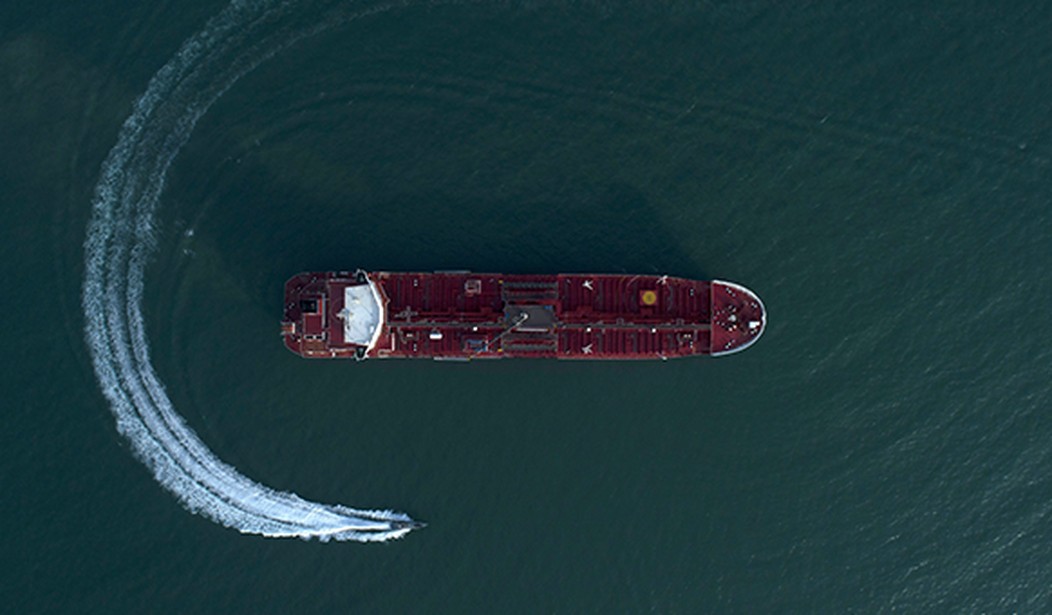Once again Iran's robed dictators are launching attacks on oil tankers attempting to transit the Strait of Hormuz. In the last two weeks of April, Iranian forces boarded and seized two oil tankers. One tanker carried crude destined for the U.S., so its seizure constituted a direct attack on American maritime commerce.
Iran's corrupt ayatollah regime believes seizing civilian ships creates diplomatic and economic leverage. From 20 percent to 25 percent of the world's daily oil supply passes through the Strait. Grabbing a tanker, or even a freighter hauling sand, tells the world the regime can disrupt global commerce. With a few armed speedboats and kamikaze drones, Tehran can spike world energy costs, rattle financial markets and get global headlines.
Iran's is one of many global state-sponsored, terrorist and criminal threats to global maritime commerce. In March, pirates operating in the Gulf of Guinea (near the Ivory Coast) seized a Danish tanker and kidnapped six crew members. In April, Yemeni pirates attacked two yachts transiting the strait between Yemen and Africa.
Compared to 2021, in 2022 worldwide piracy decreased by 13 percent. But transport disruptive incidents in the Strait of Malacca (Singapore) increased. Shipping industry advisers warn their clients that their ships entering piracy-threatened zones need up to date intelligence and to have trained their crew to defend against assault at sea.
Many commercial ships transiting these zones now have on-board armed security personnel.
One major marine insurer, Gard (based in Norway), says crews must "identify a suspicious approach or attack at an early stage, allowing defenses to be deployed..."
That general advice suggests a specific bit of advice I read several years ago. A key tactic is preventing pirates from boarding, but often that's difficult -- in other words, sink their boats. The pirates, however, often have light or heavy machine guns and rocket-propelled grenade launchers on their small craft, so the commercial ship's team, with semi-automatic rifles, is outgunned.
Recommended
Pirates, Iranian ayatollahs and other bad actors engaged in sea crime to send a message about the vulnerability of the global supply chain. In other words, they are a permanent COVID-19 pandemic. The statistics are no secret: Eighty percent of international trade by volume goes by ship, 70 percent by value.
Commercial ships aren't the only at-sea and offshore vulnerabilities.
The Gulf of Mexico, primarily off Texas and Louisiana, produces around 18 percent of America's oil and gas needs. In 1942 these platforms did not exist, otherwise they would have been easy targets for Nazi U-boats. In 2023, they do. They are easy targets for Russian and Chinese subs, and for terrorists and criminals.
Crime isn't theory. Mexican drug cartels have seized drilling platforms in the Bay of Campeche. The thugs rob drilling crews and demand ransom for their release.
Last fall Russia's Nord Stream natural gas pipelines suffered leaks and a mysterious attack. Who damaged the pipelines matters, but the incidents demonstrate that offshore infrastructure vulnerabilities have major international economic and defense consequence. American offshore pipelines are vulnerable.
Eco-terrorists observe pipeline incidents and hijacked tankers. Ecological extremists aren't the worst threat here -- but criminals and enemy nations are. Damaging Florida's and South Carolina's beaches constitutes an economic attack on the U.S.
Major point: With all these threats, do you see why marine insurance, for ships, cargo and infrastructure, is so high? Insurance adds to your food and energy bill.
What can we do? In 2019 Britain created a Joint Maritime Security Center. It's a node for information sharing and, ideally, for providing security in high-threat situations.
Information helps but doesn't replace physical security assets. The U.S. Navy needs to focus on China, not escorting ships through Hormuz. The U.S. Coast Guard has too many tasks and too few ships. Worldwide it's a similar story.
How to solve the escort problem?
Several ideas are worth considering. Arming offshore drilling platforms is a no-brainer. On-shore we have private security companies. So why not carefully regulated private maritime security companies, to defend offshore oil rigs, pipelines and wind farms? Marine insurance corporations may eventually demand their ships provide escort for commercial vessels -- and stop the pirates from boarding.

























Join the conversation as a VIP Member